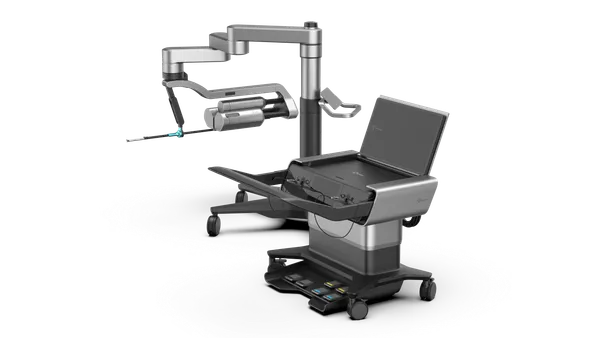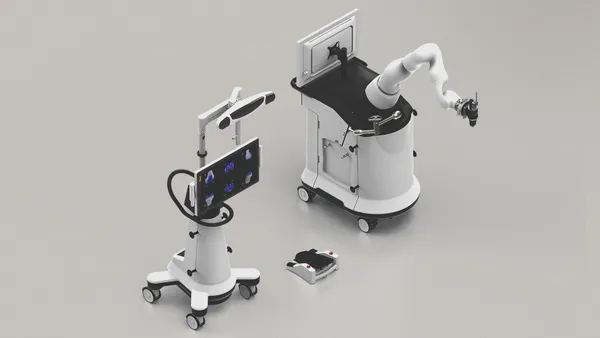UPDATE: July 14, 2021: TransMedics announced Wednesday morning that the Nasdaq has halted trading of the company's common stock as an FDA advisory committee panel was set to start a review of a premarket approval application for its Organ Care System (OCS) Liver System. The stock price was down more than 5% at the close of trading on Tuesday.
FDA's Gastroenterology and Urology Devices Panel on Wednesday is evaluating data concerning the safety and effectiveness of TransMedics' device for preserving donor livers. The panel will vote on whether the FDA should approve the system, though the agency is not required to follow the recommendation. J.P. Morgan analysts said they anticipate "another difficult meeting for TransMedics" but ultimately expect a positive decision.
Dive Brief:
- FDA has raised concerns with the data on TransMedics' device for preserving donor livers ahead of the meeting of its advisory committee on Wednesday.
- The agency's executive summary of the premarket approval application calls TransMedics' approach to randomization prone to selection bias and notes that, while the clinical trial hit its primary endpoint, the device failed to improve survival out to 24 months.
- Analysts at J.P. Morgan expect the committee of independent experts to vote in favor of the organ transport device given the unmet need, but warn that FDA's analysis is a "potentially significant blow" to the best-case scenario.
Dive Insight:
The Gastroenterology and Urology Devices Panel is set to meet virtually on Wednesday to discuss the PMA for TransMedics' OCS Liver system. TransMedics overcame concerns about the heart transplant version of its device to secure a 12 to 5 vote in its favor from the circulatory systems committee in April. FDA has prepared documents to guide the meeting of experts on Wednesday.
J.P. Morgan analysts said questions posed by FDA in the liver document "are framed less negatively" than the queries the agency put to the circulatory system experts. Key questions include whether the data support a reasonable assurance of the safety and effectiveness of OCS Liver. Yet, while FDA's tone may be softer this time around, the executive summary flags potential problems for TransMedics.
One issue relates to how TransMedics handled randomization. Investigators randomized organs to be transported via OCS Liver or cold, static storage when an available donor organ was matched to a consented recipient on the waitlist. As the principal investigator knew the preservation method prior to organ retrieval and final evaluation, FDA warned the chosen timing of randomization could affect the assessment and rejection of livers.
In 2016, FDA recommended that TransMedics blind the retrieval team from randomization until after the confirmation of donor organ eligibility upon final assessment. However, TransMedics continued to randomize organ recipients rather than donor livers "which could introduce bias in the decision whether the liver is acceptable for transplantation and/or suitable for the OCS system."
FDA said concern about the timing of randomization "is magnified" when the organ is excluded by the trial but transplanted off study without capturing data on patient outcomes.
The study rejected 43 livers, primarily because of abnormalities such as the presence of accessory vessels, which were then transplanted outside of the clinical trial. Two-thirds of those livers were randomized to the OSC cohort. FDA is concerned that most of the rejected but later used livers were in the OSC arm.
Other concerns include the effect of OSC liver on survival. TransMedics linked its device to a lower rate of early allograft dysfunction, causing the trial to hit its primary endpoint, but survival in the OSC cohort was nearly identical to the control at six and 12 months, and numerically lower at 24 months.
FDA also has safety concerns. There were three OSC malfunctions in the study that FDA said point to the potential for liver damage or breach of organ sterility. A further three livers were rejected after perfusion on the OSC device.
TransMedics said the livers were rejected because of biopsy results or increasing lactate levels and the cases were unrelated to device malfunctions or mechanical errors. FDA "has questions related to whether or not these livers were damaged by the OSC system."
Analysts at J.P. Morgan said the FDA documents "paint a picture of another difficult meeting for TransMedics" but, given the severe unmet need for organ transplants, they expect the committee to vote for approval. However, the analysts also see potential for the data to limit the use of the device in the transportation of organs that are donated after circulatory death.













